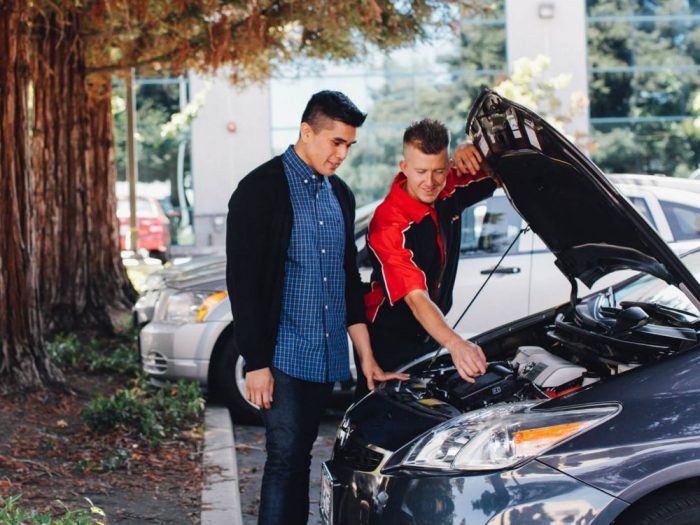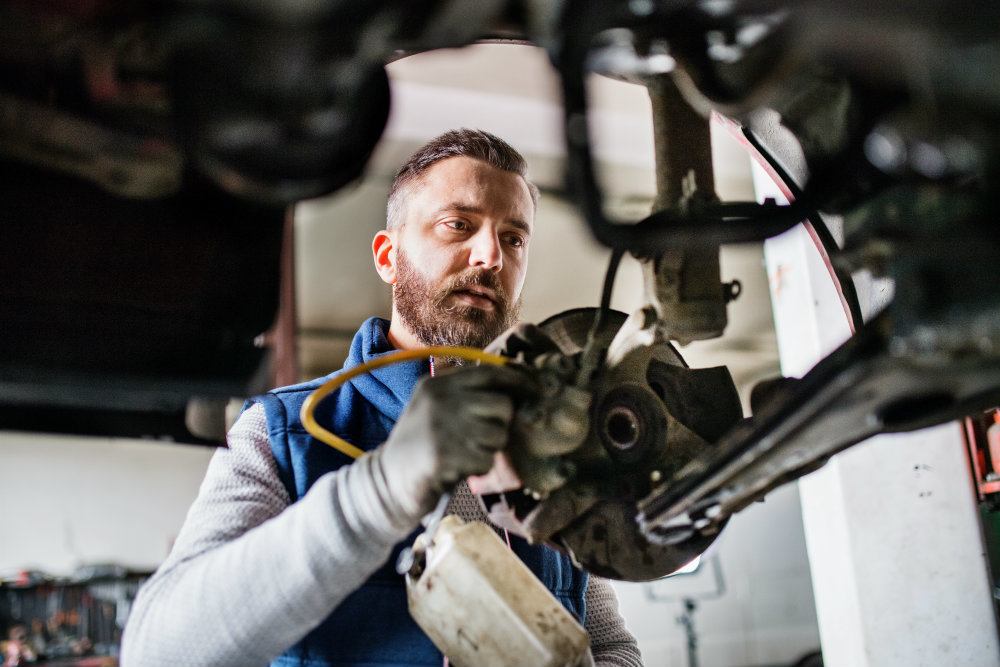Are certain parts in your car more prone to breaking down depending on the season? Are there such things as seasonal car repairs? Mobile car repair company YourMechanic came up with a study that covers the most common car repair issues by season. They analyzed the most frequent service requests and revealed some interesting yet unexpected results.
“While some of the results of our analysis are to be expected, it’s interesting to see there are other more unexpected issues occurring at certain times of the year,” said Rob Francis, VP, Growth & Operations, YourMechanic.
Top Seasonal Car Repairs
According to the study, spring is the most common time to experience issues with the window motors, window regulators, timing chain, and wheel speed sensors. The timing chain in particular accounts for 44 percent of repairs and will most likely be replaced during the spring.
By comparison, summer is not just about road trips, beaches, and refreshing drinks. The study also revealed that HVAC failure, broken cooling fans, timing chain repairs, and window lift motors are the most common car issues when the weather gets toasty. During the fall, plunging temperatures will cause problems with the air springs, engine distributor, timing cover gaskets, and heater system.
The frosty winter season is not without its usual challenges. During this time, your car’s heater system, oil cooler lines, windshield washers, and headlight bulbs will require extra attention.
Expert Analysis On Seasonal Car Repairs
“A lot of the issues listed are unpredictable,” explained Brandon Grade, Service Advisor at Findlay Toyota in Las Vegas, Nevada. “Regular maintenance and inspections can help a problem be caught before a catastrophic failure happens. But I don’t believe you are going to be able to prevent a window motor failure, regardless of how well you maintain your car.”
“The YourMechanic data is interesting, but also sort of misleading. For example, the data puts a lot of emphasis on failing window lift motors and regulators,” said Rocco DeMas, Parts Manager, VW Parts Vortex. “In my experience, this is a common problem all year long. Any drop-off in window repairs in winter is due to people using their windows less, and therefore unaware when a window lift motor or regulator fails.”
The data was analyzed by comparing the total number of each quote YourMechanic offered for different repairs in 2017 by season. From there, seasonal percentages were derived to uncover the most heavily weighted quotes by season. Only services with a minimum of 1,000 quotes were analyzed for the seasonal car repairs study.
Timing Is Everything
Interestingly enough, there is a consensus when it comes to timing chains. Timing belts, by comparison, will need to be replaced anywhere from 40,000 to 100,000 miles, but timing chains are a bit different. Yes, they are made of metal and are more durable than rubberized belts. This means a lesser chance of the chain snapping off unexpectedly as you drive.
The chain is situated inside the motor and constantly lubricated by the engine oil. Replacement is not necessary unless a serious problem develops. For some manufacturers, the timing chain is not included on the service list. For the purpose of clarity, the symptoms of a bad or failing timing chain are engine misfires, a rattling sound during idling, and metal shavings in the oil.
According to YourMechanic’s study, timing chains are most susceptible during the spring and summer.
“This is likely due to spring and summer being far more dry seasons, resulting in a lot more dust and grit getting into the oil that coats the timing chain,” YourMechanic writes in the study. “This dust and grit could potentially reduce the timing chain lifespan.”
Seasonal Swings
It’s a common misconception that winter is the hardest season for a car. Although understandable, our experts have different opinions regarding the matter.
“I live in Las Vegas, Nevada. Our winters are mild compared to a lot of the country, especially when it comes to cars. We rarely get freezing temperatures or snow but our summers are brutal,” Grade explained. “Anything that was mechanically weak before the heat hits, fails. At times we will see consecutive weeks of 110 degrees plus.”
DeMas says it’s not so much the engine during the winter, but the actual body of our cars that take the biggest brunt of the season.
“Winter is hard on cars because of collisions and corrosion, but people tend to drive less when it’s cold outside, so there’s less normal wear,” DeMas said. “People also like to let their cars warm up more, and that’s usually good for a lot of the parts in the powertrain.”
- Related: This comprehensive guide will help you prepare for the winter months.
Owner’s Manual or Dealership: Which Is Best?
There are times when the owner’s manual and the service department at the dealership will have a different take on vehicle servicing. In general, expensive repairs can be averted if you keep your car in the best possible running condition. Thus, under normal circumstances, you can expect thousands of miles of driving bliss.
“The people who built the car will know what should be done to maintain it. Knowing what the owner’s manual says will help you maintain your car properly,” Grade said. “As a service advisor, I try to follow the manufacturer’s guidelines as close as possible.”
In addition to reading through the owner’s manual, communication is also important.
“Ensure you plan regularly scheduled maintenance with a reliable mechanic and should any unknown issues happen, get in touch with them immediately,” Francis said.
“The dealership usually knows more about wear and tear in the local market, so it’s a good idea to listen to their recommendations. Still, everyone agrees the scheduled maintenance recommended by the automaker is the bare minimum,” DeMas added. “If you can build a relationship with a dealership for all your maintenance work, they’ll give you good advice and help you avoid spending money on work you might not need.”

Don’t Sweat It Too Much
In light of these most common seasonal car repairs, it begs the question: is there anything a normal person can do to prevent some or all of the maintenance issues found in YourMechanic’s study?
“As far as some of the listed failures per season, no,” Grade said. “This is why I highly recommend an extended repair warranty or extended maintenance contract with the dealership.”
“Most of the stuff listed in the YourMechanic article you can’t really plan for,” DeMas added. “There’s no required maintenance for the climate control system, or window regulators, or most of the other items listed.”
- Related: Keep your car running for the long haul with these easy tips.
Preventive Maintenance Is The Cure
It’s not a matter of certain parts breaking down per season, nor is it about expecting the AC to intermittently blow hot air inside the cabin during summer. Yes, those things can and do happen, but the key to long vehicular life starts often with the most common maintenance items: things like oil and filter changes and tire rotations for example.
“Maintenance saves you money. If you ignore your low tire pressure warning light or ignore tire rotations, your tires will wear out faster. Instead of buying a new set every 50,000 miles, you’re buying a new set in 30,000, DeMas said. “If you decide to skip a fuel filter or air filter replacement, your engine will waste fuel. You save twenty or fifty dollars on a filter, but you waste five on every tank of gas. Before long, you’re in the hole.”
The idea is to do a little before you have to do a lot.
“Maintenance is spending a little bit of money now to save a bunch of money later,” DeMas continued. “Usually people don’t save anything when they skip or ignore it, at least not in the long run.”
“Leaving any concern unchecked can not only make a problem worse, it can also be dangerous,” Francis added. “Especially while out on the open road.”
Alvin Reyes is the Associate Editor of Automoblog. He studied civil aviation, aeronautics, and accountancy in his younger years and is still very much smitten to his former Lancer GSR and Galant SS. He also likes fried chicken, music, and herbal medicine.






